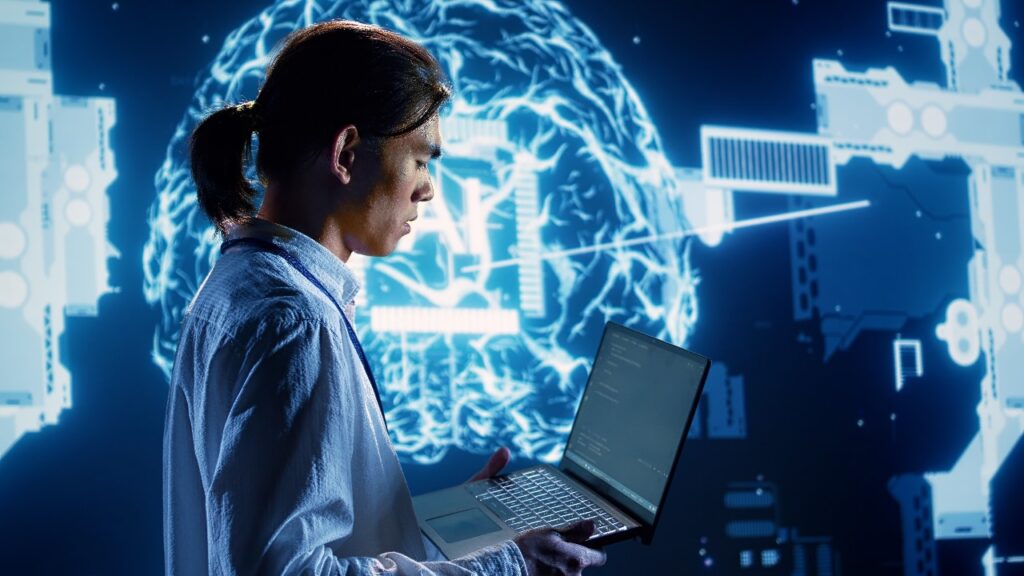How AI Will Change the Future of IT:
A Transformative Journey

Artificial Intelligence (AI) is no longer a futuristic concept—it is a present-day reality reshaping the IT landscape. From automating routine tasks to enabling predictive analytics and enhancing cybersecurity, AI is poised to revolutionize how businesses operate, innovate, and compete. This essay explores the key areas where AI will transform IT, the technologies driving this change, and the tangible business benefits that organizations can expect.
1. AIOps: AI-Powered IT Operations
Technical Overview
AIOps (Artificial Intelligence for IT Operations) is a powerful extension of AI, designed to streamline and automate IT operations. By leveraging machine learning and big data analytics, AIOps systems detect, diagnose, and resolve complex IT issues faster than traditional methods.
- Automated Incident Resolution: AIOps platforms automate incident detection, prioritization, and resolution, reducing response time.
- Root Cause Analysis: AI-driven algorithms can identify the root cause of issues, allowing for quicker fixes and improved system reliability.
- Performance Monitoring and Optimization: AIOps platforms continuously analyze performance metrics and optimize system configurations in real time to maintain smooth operations.
2. Predictive Analytics: Proactive IT Management
Technical Overview
AI enables predictive analytics by analyzing large datasets to identify trends and forecast future events. Key technologies include machine learning models, data lakes, and real-time monitoring.
- Machine Learning Models: Predict future outcomes based on historical data.
- Data Lakes: Store and process large datasets for AI analysis.
- Real-Time Monitoring: AI tools provide insights into IT performance in real time.
3. Cybersecurity: AI as the Ultimate Defender
Technical Overview
AI is revolutionizing cybersecurity by enhancing threat detection, response, and prevention. With technologies like behavioral analytics, threat intelligence, and automated response, AI systems can now mitigate threats in real time.
- Behavioral Analytics: Detect anomalies and potential threats by analyzing user behavior.
- Threat Intelligence: Aggregates threat data to identify emerging risks.
- Automated Response: AI-powered systems can autonomously contain and mitigate cyberattacks.
4. Cloud Computing: AI-Driven Optimization
Technical Overview
AI is transforming cloud computing by optimizing resource allocation, cost management, and performance. AI-enabled tools automatically scale cloud resources, manage costs, and strengthen security.
- Cloud Cost Management: AI identifies opportunities for cost savings.
- Auto-Scaling: AI adjusts cloud resources based on demand to maintain peak performance.
- Cloud Security: AI identifies vulnerabilities and enforces compliance policies.
5. Software Development: AI-Powered Innovation
Technical Overview
AI is revolutionizing software development by enhancing productivity and accelerating innovation. With AI-assisted coding, testing automation, and DevOps optimization, software delivery becomes faster and more reliable.
- AI-Assisted Coding: Suggests code snippets and automates repetitive tasks.
- Testing and Debugging: Automates testing and identifies bugs faster than manual methods.
- DevOps Automation: Optimizes CI/CD pipelines to accelerate delivery cycles.
6. Edge Computing: AI at the Edge
Technical Overview
AI is driving the adoption of edge computing, enabling real-time data processing at the edge of networks. With edge AI chips, federated learning, and IoT integration, decision-making happens faster and closer to where data is generated.
- Edge AI Chips: Enable AI processing directly on edge devices.
- Federated Learning: AI models trained locally on edge devices for data privacy.
- IoT Integration: Real-time data analysis from IoT devices allows for smarter operations.
7. Networking: AI-Driven Network Optimization
Technical Overview
AI is optimizing network management by enhancing performance, predictive maintenance, and security. AI-driven network management and software-defined networking (SDN) ensure the network operates at its best.
- AI-Driven Network Management: Monitors network performance in real time to optimize operations.
- Predictive Maintenance: AI predicts and prevents network failures before they occur.
- Enhanced Security: AI detects and mitigates network threats, securing critical infrastructure.
Business Benefits of AI for IT Transformation
By embracing AI, organizations can unlock significant business value. Here’s how AI will directly benefit businesses, supported by compelling numbers:
- Cost Reduction: Automation of routine tasks and predictive maintenance can reduce IT operational costs by 20-30%, providing direct savings and improved operational efficiency.
- Improved Efficiency: AI-driven solutions reduce human error and speed up processes, helping businesses accomplish more with fewer resources. Automation and real-time AI optimization lead to a 50% reduction in downtime, keeping critical systems running smoothly.
- Enhanced Security: AI-based security measures can detect threats in seconds, cutting down response times from days to hours. This minimizes the impact of cyberattacks and reduces the risk of costly data breaches. For businesses, this means avoiding millions of dollars in potential losses and maintaining customer trust.
- Faster Time-to-Market: By leveraging AI-powered automation in software development, businesses can reduce their time-to-market by 30-50%, helping them stay ahead of the competition and meet customer demands more quickly.
- Scalability & Flexibility: AI’s ability to optimize cloud resources and auto-scale services based on demand allows businesses to reduce cloud spending by 20-40%, while simultaneously improving service availability during peak usage periods.
- Data-Driven Decisions: Predictive analytics powered by AI enables organizations to make more informed, data-driven decisions. This leads to optimized resource utilization and up to 30-40% cost savings, making operations more efficient and profitable.
- Customer Experience: AI-driven automation of support services improves response time and service quality, increasing customer satisfaction and loyalty. A reduction in customer support resolution time leads to higher customer retention and, in turn, a 20-25% increase in customer lifetime value.
Conclusion: The Future of IT with AI
AI is not just a tool—it is a transformative force that will redefine the future of IT. By automating operations, enabling predictive analytics, enhancing cybersecurity, optimizing cloud computing, accelerating software development, powering edge computing, and revolutionizing networking, AI will drive efficiency, innovation, and growth across industries.
Organizations that embrace AI today will gain a competitive edge, unlocking new opportunities and achieving long-term success. At Mirage Solutions, we are committed to helping businesses harness the power of AI to transform their IT infrastructure and achieve their strategic goals.
Contact Mirage Solutions for support and consultation today to explore how AI can elevate your business.
